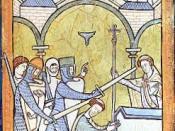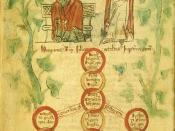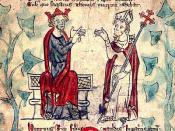In the play Becket by Jean Anouilth, a chancellor-turned Archbishop by the name of Thomas Becket is severely tested. However, this is no ordinary test. What's being tested, you see, is Becket's honor. Throughout the play, the honor of Thomas Becket is tested in various ways; from struggle between the Normans and the Saxons to deciding between the state and the church to his loyalty to the king or God.
Throughout the play, there is an obvious tension between the Normans and the Saxons. Becket himself had been born and raised a Saxon, which was the lower class, but had gained status to that of Norman when he becomes the right-hand man of King Henry II, king of Normandy. But there is bound to be a conflict along the way, right? Exactly. One day a soldier brings a young Saxon monk by Becket on his way to take him to the Provost, because he was hanging around the camp with a knife, waiting, most likely, to kill Becket for being a traitor to the Saxons.
Becket realized this and was very understanding. He convinced the guards to leave the monk with him, saying, "Leave him to me. I'll question him" (page 48). You see, although he was the Chancellor of England, Becket was in control of the Abbeys in Hastings, where the boy was from, so Becket is in direct control of the boy. Really, Thomas Becket has no intention of questioning the boy directly, but seems more interested in what the boy thinks of his "dishonorable", traitorous essence. In this angry young man, Becket sees himself and sets the boy free from the torture he was destined for, saying, "The King is waiting. And this conversation could go on indefinitely, but I want to keep you alive, so...


